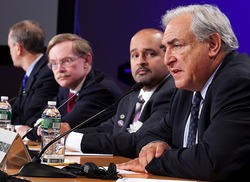 The downfall of Dominique Strauss-Kahn launches a predictable rich-poor debate. The postwar arrangement, with a permanent American hold on the World Bank presidency and the European right to the IMF managing director’s job, is an obviously dated anachronism. Developing countries want the next choice; Europe wants to keep the job; the U.S. administration hopes to avoid offense to either. Here’s a different take: rich country, poor country, or in between, it’s time for a female.
The downfall of Dominique Strauss-Kahn launches a predictable rich-poor debate. The postwar arrangement, with a permanent American hold on the World Bank presidency and the European right to the IMF managing director’s job, is an obviously dated anachronism. Developing countries want the next choice; Europe wants to keep the job; the U.S. administration hopes to avoid offense to either. Here’s a different take: rich country, poor country, or in between, it’s time for a female.
True enough, no developing-country expert or statesman has ever led the IMF or the World Trade Organization (WTO)—but the top jobs at the UN, International Labor Organization, and WTO have gone to nationals of South Korea, Argentina, Thailand, Ghana, Egypt, Burma, and Peru. In the near-century since the launch of the League of Nations and International Labor Organization in 1919, however, no woman has ever been appointed chief of any of the five big international organizations.
The past 92 years, to be more specific, have brought 52 such appointments. They include eight managing directors of the IMF, ten presidents of the World Bank, eight secretaries-general of the UN, seven directors-general of the General Agreement on Tariffs and Trade and the WTO, and nine directors-general of the International Labor Organization. Women have been zero appointments out of 52 opportunities—
and if you throw in the three secretaries-general of the League of Nations, 0 for 55.
A bit further down the ladder, the international-organization record improves, but carries an unsettling aura of pink collars and glass ceilings: New Zealander Helen Clark is the UN Development Programme’s first woman administrator after six men; the World Health Organization’s Margaret Chan is the second female WHO chief; Sadako Ogata held the UN High Commission for Refugees between 1990 and 2000.
National governments are much the same. As of 2010, women made up 29 percent of the world’s health ministers, 26 percent of the culture ministers, and 25 percent of the education ministers. As we move on to law and commerce, the figures fall off, to 18 percent of justice ministers and 16 percent of trade ministers. And in matters of money, war, and final decisions, women remain almost absent from the cabinet chairs: last year women accounted for 6 percent of finance ministers, 5 percent of presidents and prime ministers, and 4 percent of defense ministers.
So as the IMF’s executive board looks around for a successor, by all means look for the best individual. Certainly, argue out the European and developing world cases. But also—and perhaps especially given the sad circumstances that make this decision necessary—think about making a bit of history.
Photo credit: International Monetary Fund
Click to
View Comments